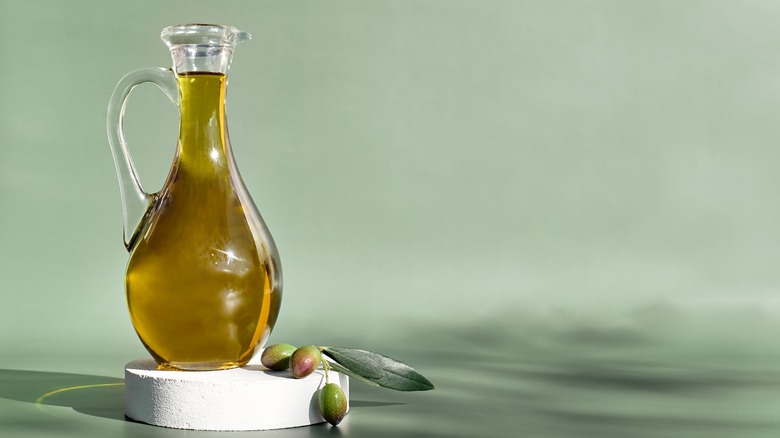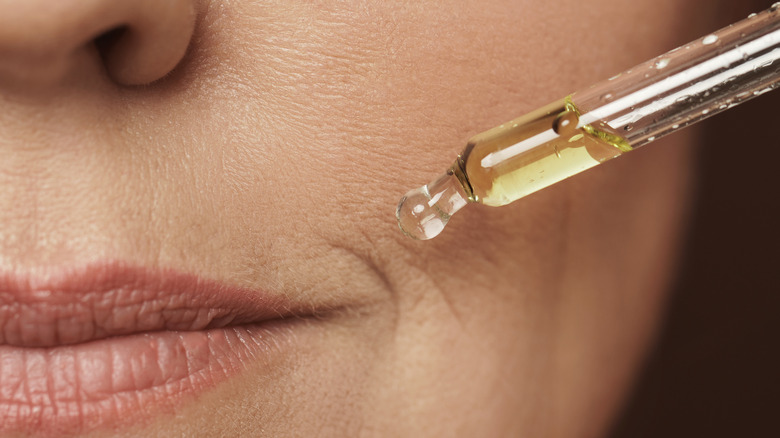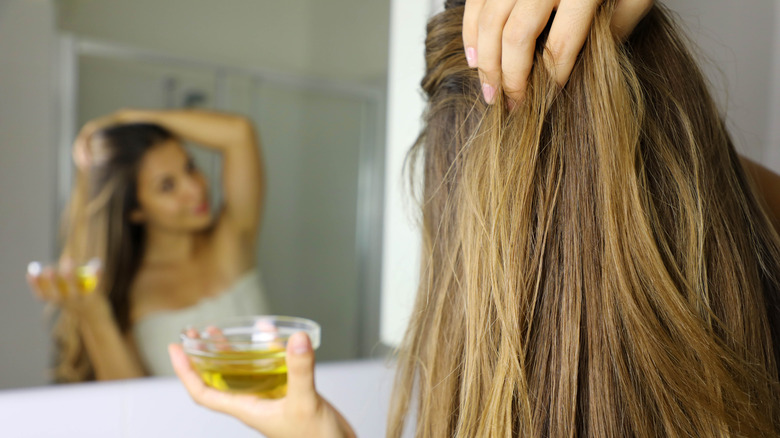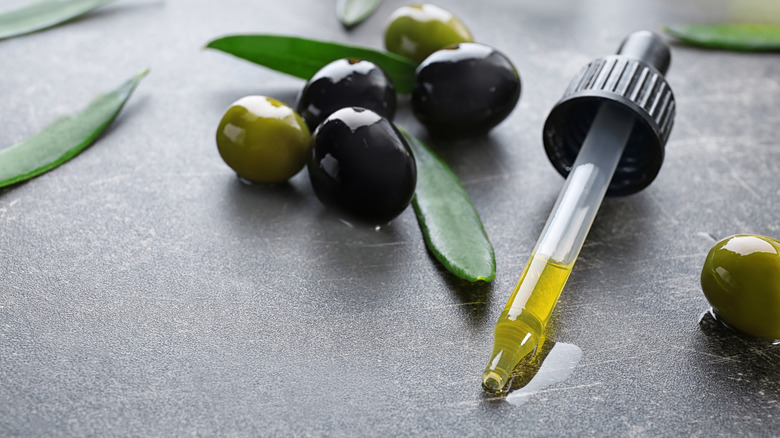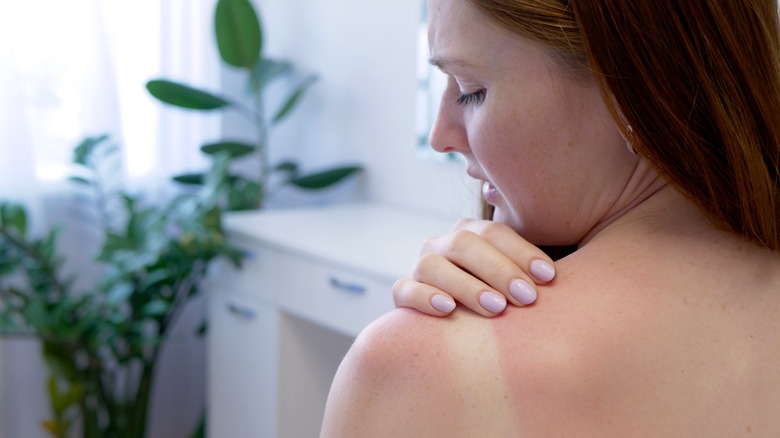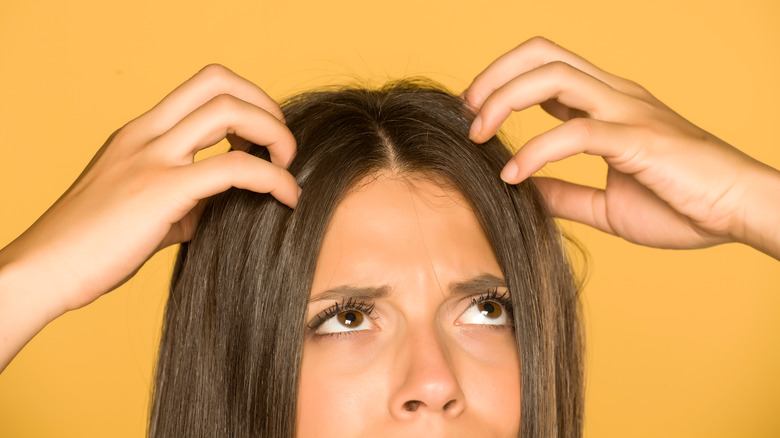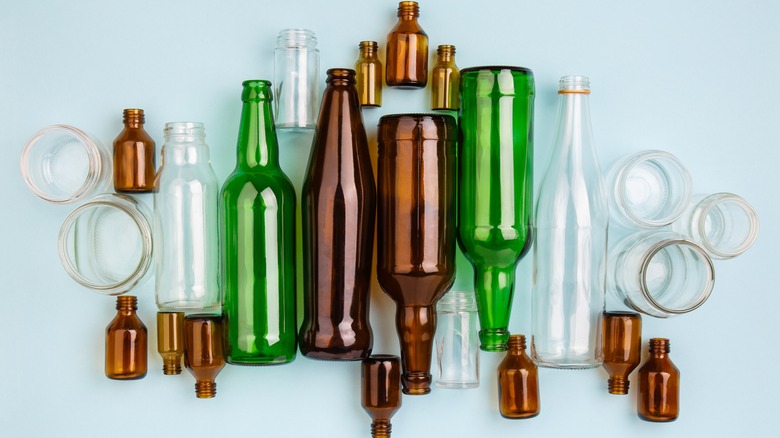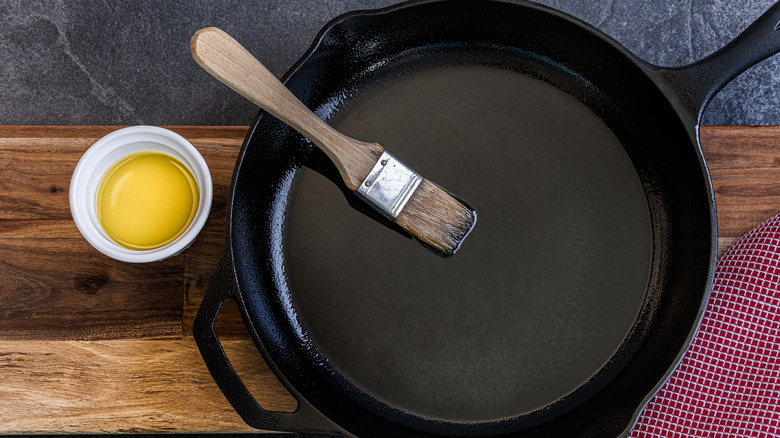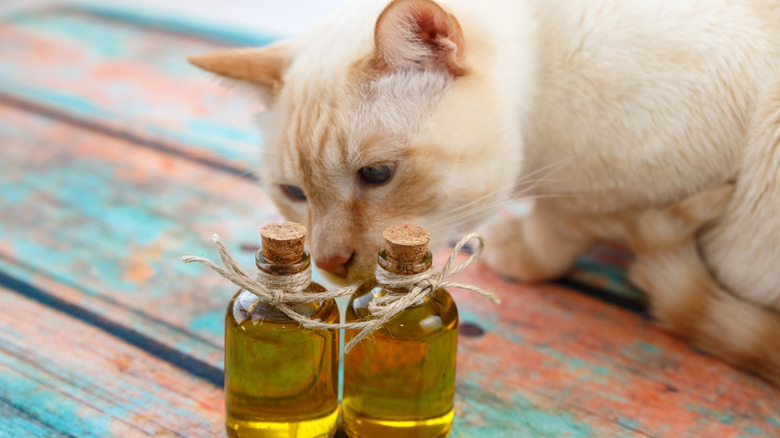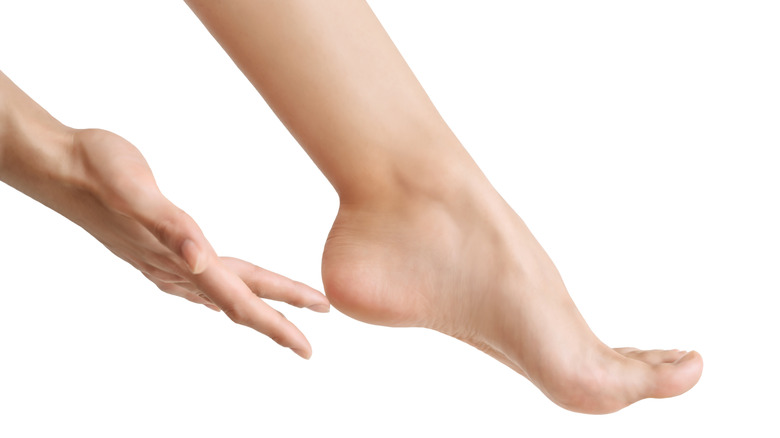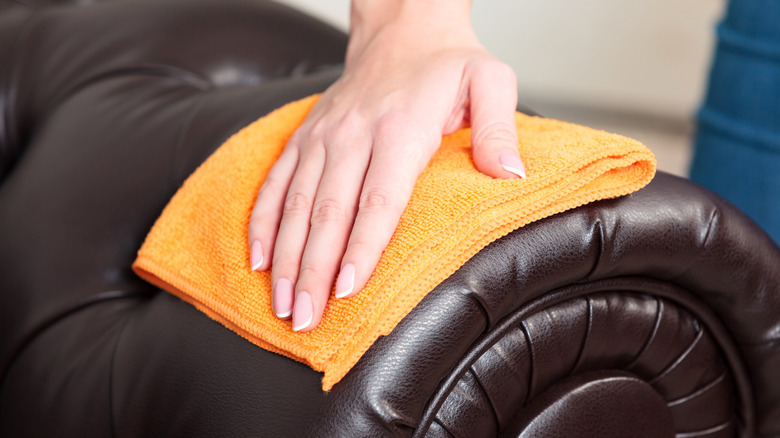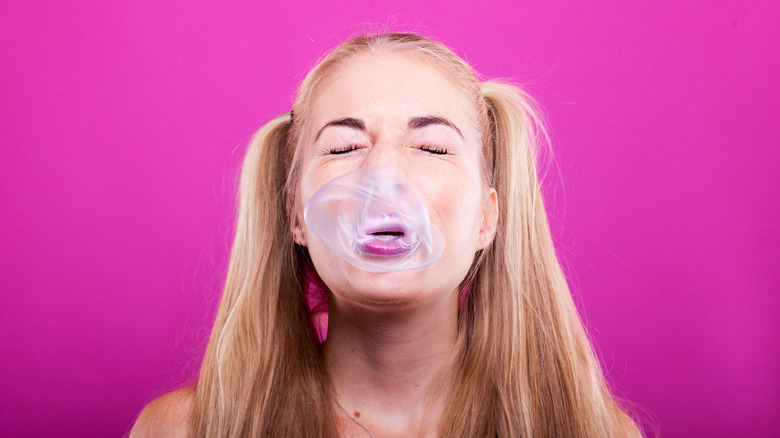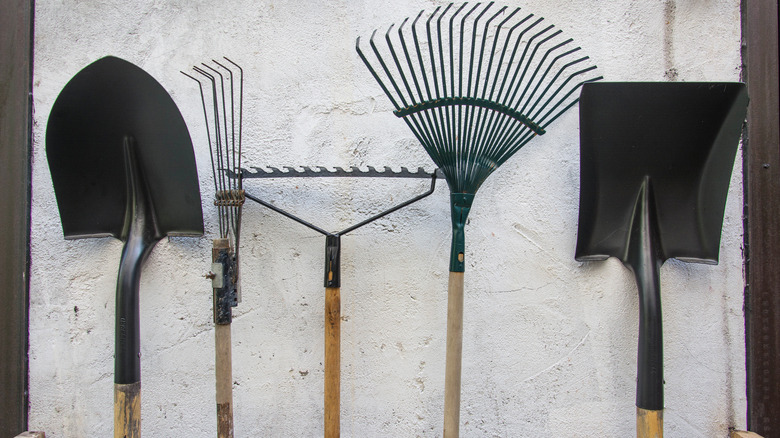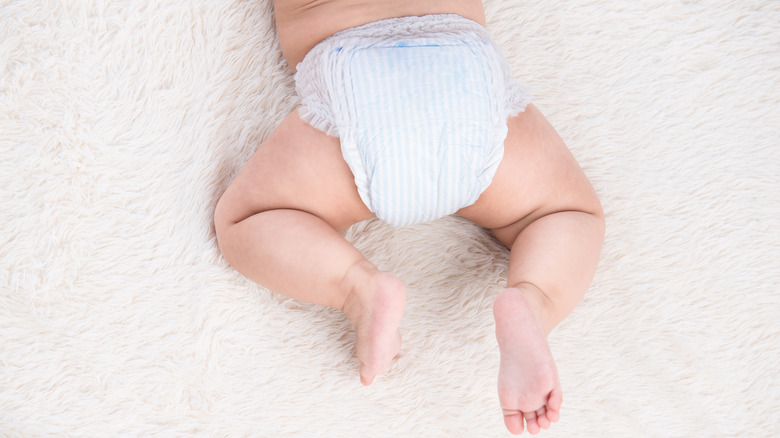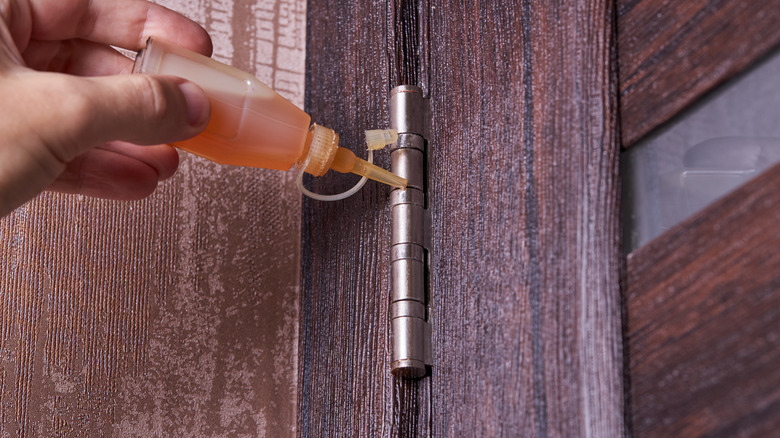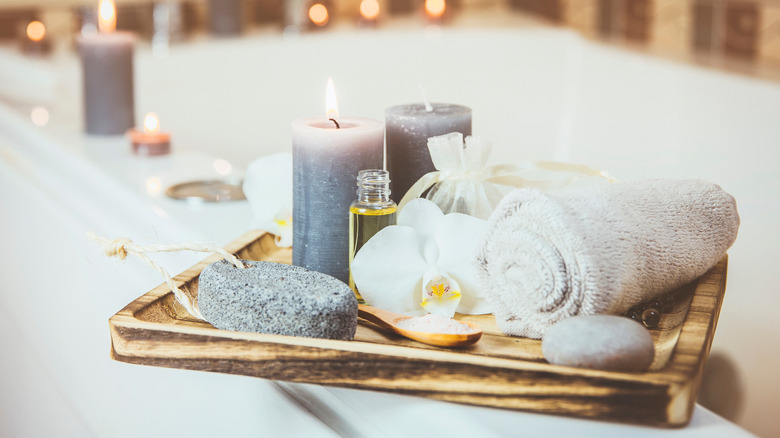15 Uses For Olive Oil You Need To Know
Olive oil is a kitchen staple with many uses; from salad dressings and marinades to roasting and grilling, it can do it all. Olive oil is oil made from pressed olives and is an excellent source of antioxidants and healthy fat. Today, olive oil is used across the globe, but it originally comes from the Mediterranean region, where it makes up a big part of the Mediterranean diet.
Olive oil differs from other cooking oils like vegetable and canola oil because it isn't as processed as other cooking oils. Less processing means that its natural taste and health benefits remain intact (via Olive Oil Lovers). However, not all olive oils are the same.
There are different types of olive oil at your local supermarket, and they range in flavor and price. Extra virgin olive oil is of the highest quality and must follow strict standards. It is unrefined and has a distinct, clean flavor. Virgin olive oil is the next best and is similar to extra virgin olive oil. Pure olive oil is a mix of refined olive oil and virgin olive oil. It has fewer health benefits, but a higher smoke point making it a perfect everyday oil to fry and sauté.
But olive oil isn't just for cooking and consuming. There are many ways to use olive oil beyond the kitchen. It is a surprisingly multi-purpose oil you will be glad is in your pantry.
1. Skin and lip moisturizer
Adding olive oil to your diet is healthy, but did you know adding it to your beauty routine is another way to reap the health benefits of olive oil? Thanks to high levels of vitamins and antioxidants, olive oil is an excellent skin moisturizer. For one thing, it is rich in vitamins K and E (via WebMD). The National Library of Medicine explains that vitamin E is a fat-soluble antioxidant that has been used in dermatology for its benefits to the skin.
You can apply olive oil to your skin as a daily moisturizer and use it on your lips instead of lip balms. The best way to use olive oil as a moisturizer is to apply it directly to your skin. Once applied, let it soak into your skin, then wipe away any excess. However, if you have oily or sensitive skin Healthline recommends avoiding olive oil as a moisturizer because it may be an irritant.
In addition, you can use it to remove eye make-up. According to the American Academy of Ophthalmology, it is safe to use around the eyes to remove mascara, eye shadow, and eyeliner. So next time you run out of make-up removal wipes, head to the kitchen for some olive oil to remove your eye make-up.
2. Conditioning hair mask
Olive oil is perfect for a simple DIY hair conditioning mask. The main reason olive oil is an excellent way to moisturize your hair is that it contains oleic acid and squalane. Both are emollients that create a seal that maximizes moisture-retention. In addition, adding olive oil to your haircare routine keeps split ends at bay, and some studies even suggest that it promotes hair growth (via Plos One).
Since olive oil is heavy oil, it works best as an overnight hair mask or deep conditioning treatment. Apply to your hair but avoid applying it directly on the scalp. According to certified cosmetologist Fabio Scalia, olive oil should be avoided if you have straight, thin hair because it may make your hair feel greasy. He explains that the ideal head of hair that benefits most from olive oil is thick, wavy, or curly hair since these types tends to be drier. Likewise, professor of dermatology Patrick Zito, cautions against using olive oil if you are prone to dandruff because it can make it worse (via Insider).
Olive oil also works as a frizz-tamer. Apply a small amount to your hands and rub them together, then pat down fizzy flyaways to keep your mane in place.
3. Remove ear wax
Nobody wants to talk about ear wax, but it's a completely natural bodily function, and sometimes the body makes too much of it. Of course, you can go to your doctor, and they can help you remove excessive ear wax, or you can do it in the privacy of your own home with the help of olive oil.
Ideally, your ears should clean themselves, but sometimes excessive ear wax builds up and can cause other issues. The Hearing Health Foundation recommends putting a drop of olive oil in your ear canal once a week to help loosen ear wax if excessive buildup is causing irritation. They strongly advise you not to put anything in your ears to try and clean them, like Q-tips, keys, or other small things. Instead, wash around the ears when you are showering with soap and water, then use a drop of olive oil to help the natural self-cleaning process that your ears are already doing.
Everyone has ear wax, but it affects older people more, and the Fisher Center for Alzheimer's Research Foundation explains that hearing loss (which may sometimes be attributable, in part, to ear wax buildup) has been linked to dementia, social isolation, and Alzheimer's disease. So, make sure to get your ears checked regularly, especially if you're having a hard time hearing. If your doctor points to excessive ear wax as the culprit, your long-term health may benefit from using olive oil to help keep them clean.
4. Soothe sunburned skin
Warm summer days are perfect for spending time with family and friends. Being active and enjoying the outdoors is a great way to get fresh air, but it's easy to get a little too much sun. Even if you are diligent about using sunscreen, it is still possible to get sunburned. Many sunscreens wash off when sweating or swimming, leaving you unprotected. While the CDC recommends wearing a sun hat, staying in the shade, and liberally applying and reapplying sunscreen, many of us still manage to get sunburned. It is no surprise that more than one-third of Americans get sunburned each year (via U.S. Department of Health and Human Services).
Luckily, olive oil can help you with your sunburn. Sunburned skin is red, dry, and hot to the touch. Sunburns take around five to seven days to heal, and the healing process is uncomfortable. According to Care Team Family Health and Specialty Care, the best way to use olive oil to relieve some of the pain and discomfort from sunburn is to mix it with aloe vera. The olive oil softens the skin, and the aloe vera has a cooling effect.
Dermatologists consulted by Healthline emphasize that you should not use olive oil or any oil for tanning, only for soothing sunburns. Oils attract intense UV rays and increase the risk of skin cancer and sunburn.
5. Cure head lice
It's every parent's nightmare — the dreaded call from the school that there is a lice outbreak. Lice is a common issue in schools, and it's a problem that's difficult to get rid of. It may take several shampooing sessions with over-the-counter lice shampoo, which is thick and stinky and isn't always effective. But surprisingly, olive oil is an effective lice treatment.
Applying a thick layer of olive oil to your child's scalp is less irritating than shampoo and may be an easier way to remove the little irritants. The idea is that the olive oil suffocates the lice, killing them. For the best results, apply the olive oil, then cover your child's head for eight hours. The thick oil suffocates the lice, and once suffocated, you can use a nit comb to comb them out of your child's hair. According to LiceDoctors, olive oil is not able to kill the unhatched lice eggs. But applying olive oil and using the comb to remove the eggs ensures an effective treatment.
While lice isn't a serious risk to your child's safety, you need to take care of it as soon as possible to stop the itching, so it's good to know that an effective lice treatment is already in your pantry.
6. Remove stickers and labels
Do you save empty glass jars for projects around the home? Then you know what a pain it is to remove stuck-on labels. Labels use a special type of glue that can take a lot of elbow grease to remove. But here is a hack for you: Olive oil can help you remove those annoying labels so you can use your empty jars for other projects.
The best way to use olive oil to remove labels is to slather the olive oil over the label and wait 30 minutes, then remove it. Depending on how much glue residue is stuck to the jar, you might need to do this a couple of times. Once the residue is removed, just wash the jars, and they're ready to use.
Olive oil also is a great way to remove stickers from places where there shouldn't be stickers, like furniture, walls, and hardwood floors. Anyone with kids knows stickers often end up in places they shouldn't be, so having a plan to remove them easily without harsh chemicals or abrasives is an excellent parenting hack.
7. Season a cast iron skillet
A cast iron skillet is an amazing kitchen tool. It's an essential piece of cookware for any home cook who's serious about their cooking skills. And, anyone who owns a cast iron skillet knows the best way to care for it is to season it regularly.
Seasoning a cast iron skillet is a process that creates a nonstick surface on the skillet. According to Lodge Cast Iron, any oil or fat can be used to season a cast iron skillet. They recommend heating the cast iron skillet to the oil's smoke point because that's where the magic of seasoning takes place. It's really a two-step process. First, polymerization occurs when the thin layer of oil applied to the skillet is heated and the oil dries, and carbonization takes place with the application of heat above the smoke point of the oil which creates a carbon matrix and a nonstick surface (via Science of Cooking).
Extra virgin olive oil is not the best choice for seasoning because its smoke point is only 375 F. It's better to save your expensive extra virgin olive oil for salad dressing or drizzling on thick pieces of bread. Instead, using refined olive oil or one that has a percentage of other oils mixed in is a better option because the smoke point is higher, closer to 465 F (Lodge Cast Iron). Taking care of cast iron cookery is a surefire way to make it last for years to come.
8. Keeps pets healthy
People go to great lengths to ensure their pets are healthy. And surprisingly, that bottle of olive oil on your shelf can help you take care of your favorite furry family member.
Pet parents with cats know that hairballs are part of having a cat. Since cats lick their fur to clean themselves, any hair they ingest can create hairballs that they need to cough up, usually early in the morning when their pet parents are sleeping. Coughed up hairballs are gross, but they are part of the natural ways cats keep themselves clean. WebMD recommends regularly brushing your cat to help them control hairballs, and that once a week pet owners put a small amount of olive oil in their cat's food to help lubricate their digestive tract to make coughing up hairballs easier. Plain olive oil or a bit of tinned tuna in olive oil is all it takes to help your feline friend.
Pet parents of dogs can also use olive oil. Dr. Reeder, a board certified veterinarian dermatologist explains that dogs can ingest olive oil to combat inflammation and itching associated with allergies (via Be Chewy). The key is to use it in small doses and see if it causes any adverse gastrointestinal side effects before adding it to a weekly routine. After extended use, pet parents may notice a positive effect on their dog's fur too. Dr. Reeder told Be Chewy that he only recommends that pets use olive oil internally, not applied to their coats.
9. Repair cracked heels
Regular pedicures are a great way to keep your feet looking good and feeling healthy, but it can be challenging to get to the salon regularly. In the cold winter months, dry skin and cracked heels are common problems for men and women. In addition to the weather, some health issues like diabetes, eczema, hypothyroidism, and obesity make people more prone to cracked heels (via WebMD). But treating cracked heels doesn't have to require a trip to the salon or podiatrist; instead, grab a bottle of olive oil and get ready for some healing.
The best way to use olive oil for cracked heels is to apply it liberally to your heels and wear socks to keep the moisture locked in. Doing this several times a week should keep your heels moisturized and reduce the cracking. Ideally, you want to stop cracked heels before they become a problem. Healthline advises avoiding flip-flops, tight shoes, and open-backed sandals to reduce exposure to environmental factors that can contribute to dryness. And Precision Foot and Ankle Centers recommends staying hydrated, exfoliating regularly, and moisturizing daily to prevent cracked heels.
10. Polish leather
The scent of old leather is one of those nostalgic smells that can take you to another world. Old baseball gloves and vintage leather jackets need to be oiled and polished to keep the leather soft and pliable and avoid damage from cracking. You don't have to buy expensive leather oils; rather, you can use the olive oil you already have at home to polish your favorite leather goods. Steelhorse Leather advises using any natural oil to restore leather, so choosing extra virgin olive oil here is the best choice. Simply rub the extra virgin olive oil into the leather with your fingertips, then let dry. When the item is dry, wipe off any excess oil. For leather shoes that need a little shine, mix olive oil with a few drops of lemon juice (Reindeer Leather).
Leather furniture benefits from an olive oil wipe-down, too. LeatherProfy explains that the best way to use olive oil on furniture for cracks or scratches is to apply the oil to a cloth first, then use it to buff out scratches and moisturize the leather.
11. Remove gum stuck in hair
Kids love chewing gum. It is sticky and sugary and they love to blow bubbles with it, pull it out, and stretch it on their fingers. And despite every parent's warning, kids will inevitably get chewing gum stuck in their hair. Of course, you can always cut chewing gum out of hair. Hair will grow back, after all. But if you're looking for a way to remove gum from your child's mane without getting the scissors involved, then try olive oil. The American Academy of Dermatology Association states that vegetable oils (like olive oil) applied directly to the gummy spot and massaged into the gum helps remove the sticky glob.
Gum isn't the only thing responsible for sticky hair; a weekend breakfast of pancakes and syrup can leave your child with a sticky mess of hair, too. So, grab the olive oil and get to work. Any type of olive oil will work for removing the gum, syrup, and other sticky culprits.
12. Clean garden tools
Gardening is a relaxing pastime. You get to spend time outside and dig your fingers in the dirt. More and more people are getting into gardening, even urban farming in populated areas. It is one of the healthiest hobbies, and if you are lucky, you end up with beautiful flowers or fresh vegetables and herbs. But maintaining a garden takes time and tools. Gardening tools should be a one-time expense. Taking care of your tools by cleaning them after each use and making sure to keep them out of the rain is key to giving them a long life. But another thing you can do is to oil them to keep them in tip-top shape.
Olive oil is an excellent and inexpensive way to keep those garden tools ready for use. Applying olive oil on the metal parts of the tools keeps rust away. And olive oil rubbed into the wood handles of shovels, rakes, and trowels keep the wood from cracking and causing unwanted splinters.
13. Soothe diaper rash and cradle cap
Parents of newborns have enough to deal with — sleepless nights, endless crying, and nagging self-doubt are common stressors. They have a lot on their plate, and they shouldn't have to worry about diaper rash and cradle cap, too. Both conditions are common in babies and can be cured with a little olive oil.
Diaper rash is uncomfortable for the baby and can cause a normally happy baby to be fussy and irritated. Medicine Net recommends changing the baby's diaper often, exposing the skin to air to dry out, and applying a small amount of olive oil to the irritated skin.
Cradle cap is a scalp condition that causes crusty skin patches on the baby's head. WebMD recommends applying a little olive oil twice a day to your baby's scalp and then wiping the flakes off with a soft cloth. While cradle cap is a condition that affects most babies and will resolve itself without treatment, it can give anxious parents peace of mind to use olive oil.
14. Fix squeaky things
Can't find that canister of WD-40 in your garage? That's okay. You can use olive oil for your squeaky problems. According to Aspire Doors, WD-40 isn't actually the best option to fix squeaky doors because it is designed as a cleaner and doesn't provide enough lubrication to affect the squeaky noise. So, save your WD-40 for other uses and reach for olive oil, instead.
Squeaky doors can be the result of old or dirty hinges. The door hinge consists of the hinge and the pin, and that is where the annoying squeaky sound is coming from.
Olive oil works to stop the squeak right away. Start by cleaning the hinge, then apply some olive oil to the parts to get the lubrication necessary to eliminate the noise. It's best to use a dropper or your fingers to do the application to help keep the mess to a minimum.
15. Bath oil to relieve winter skin
Many people suffer from dry, itchy skin in the winter. The cold weather combined with the dry air in the home from heaters and fireplaces wreaks havoc on the skin. A great way to warm up and moisturize your skin is to take a warm bath with olive oil. That might sound like a strange idea, but Sophia Loren, the ageless beauty and movie star, swears by olive oil baths to keep her skin looking perfect (per Olive Oil Times). One look at her and you will be convinced to try it, too.
The best way to add olive oil to your bath is just a spoonful directly into the bath water. Be careful not to get the water too hot because hot water can further dry out the skin. Instead, opt for warm water and soft music for a self-care indulgence that you definitely deserve.
You can also try infusing olive oil with fragrant herbs for an aromatherapy experience right in your own bathtub. If you are suffering from winter sniffles or congestion, eucalyptus is the perfect herb for opening sinuses and helping you clear your head (via Healthline). You might feel like the soup of the day soaking in olive oil, water, and herbs, but your skin will be subtle and soft.
